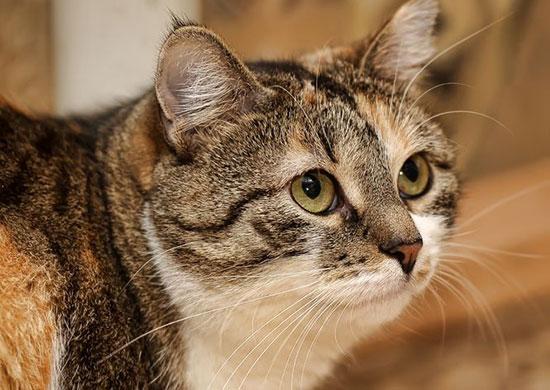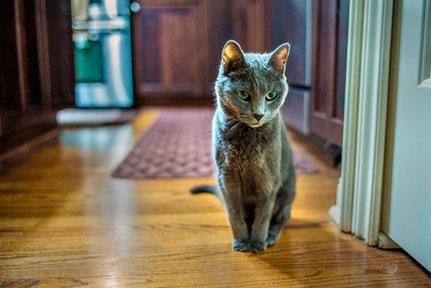This content is archived from the Feline Nutrition Foundation
Choosing the Right Insulin for Your Diabetic Cat
- Updated: Saturday, June 01, 2019 05:42 PM
- Published: Sunday, January 02, 2011 03:20 PM
- Written by Andrea Tasi, VMD
 My cat was diagnosed with steroid induced-diabetes. For the past three years, he's been on Depo-Medrol® injections every three months or so for IBD. Could his diabetes be reversed?
My cat was diagnosed with steroid induced-diabetes. For the past three years, he's been on Depo-Medrol® injections every three months or so for IBD. Could his diabetes be reversed?
He always ate mostly raw cat food and Katz-N-Flocken® dry. I am now weaning him to Wysong Epigen® with no carbs. He was just diagnosed and started on NPH insulin, which my vet has had good luck with. Should I insist on PZI? My vet says it's hard to get sometimes.
These are actually a whole lot of related questions in one paragraph.
First, I'd like to address the issue of treating inflammatory bowel disease with Depo-Medrol® injections.
Depo-Medrol® is an injectable repository form of very potent corticosteroid. Using repository corticosteroids to treat any chronic medical condition is a risky endeavor for two reasons:
- It has been my professional experience that trying to control any chronic condition with periodic injections of a potent form of corticosteroid is like trying to drive in traffic with your cruise control on. There is no ability to modify what is going in response to the changing conditions.
- The complication rate is much higher than when oral forms of corticosteroids are used. Obesity, opportunistic infections and diabetes are common side-effects of repeated Depo-Medrol® injections. The most common reason these injections are used is that the cat is difficult to medicate. Oral prednisone or prednisolone can be compounded into flavored liquid form or flavored chewy treat. Alternatively, the pill form of the drug can often be hidden in Greenies® brand Pill Pockets.® There are always other options to try before giving up on oral medication completely and going to injections.
Second, can the diabetes be reversed? You do not mention if the injections are being continued, if some other form of corticosteroid is being given or if the cat is being kept on any other medication. If Depo-Medrol® is being continued, I suspect it will be impossible to get this cat into a remission of his diabetes. If oral, less potent forms of corticosteroid are being used, there is perhaps a slim possibility of a remission of his diabetes. The longer the cat is diabetic, the less likely the diabetes can be reversed, due to a phenomenon called glucose toxicity. This refers to the fact that the longer a cat's blood sugar remains high, the less effectively the cat can respond to its own insulin or supplemental insulin. Sooner or later, the cat may experience pancreatic burnout, where the pancreas simply exhausts its ability to produce insulin. Cats that lose the ability to produce their own insulin will probably never go into remission from their diabetes.
 Third, what type of insulin to use? There is increasing consensus that Lantus®, sometimes referred to as glargine insulin, has the best rates of remission of diabetes in virgin diabetics. A virgin diabetic is one who has never been on insulin before. In over twenty years of practice, I have used many different kinds of insulin. My experience has been the best with Lantus® insulin. A published paper compared PZI to Lantus® and bears out my experience: better remission rates in the cats treated with Lantus®.¹ Veterinarians must learn how to use Lantus® insulin properly, as it is different from other types of insulin. The protocol for regulating cats on Lantus® must take these differences into account, usually by increasing the insulin dose at a slower pace/longer interval than on other types of insulin. VIN, the Veterinary Information Network, has many references that a veterinarian can review to become familiar with the best way to use Lantus® insulin.
Third, what type of insulin to use? There is increasing consensus that Lantus®, sometimes referred to as glargine insulin, has the best rates of remission of diabetes in virgin diabetics. A virgin diabetic is one who has never been on insulin before. In over twenty years of practice, I have used many different kinds of insulin. My experience has been the best with Lantus® insulin. A published paper compared PZI to Lantus® and bears out my experience: better remission rates in the cats treated with Lantus®.¹ Veterinarians must learn how to use Lantus® insulin properly, as it is different from other types of insulin. The protocol for regulating cats on Lantus® must take these differences into account, usually by increasing the insulin dose at a slower pace/longer interval than on other types of insulin. VIN, the Veterinary Information Network, has many references that a veterinarian can review to become familiar with the best way to use Lantus® insulin.
Not only does Lantus® insulin work better in most diabetic cats, but it is also readily available at any human pharmacy, which makes it convenient to obtain. It does require a prescription, though, in contrast to many other type of human insulin. PZI insulin is only available from a limited number of sources, and is not subject to the more rigorous quality control that a major manufacturer human insulin like Lantus® is.
Additional Reading
Duke's Story: Inflammatory Bowel Disease
An Answer For Alex: Raw Food and Tight Regulation
Answers: Is It Okay for My Cat to Have Milk?
Saving Alistair: How Lyn Thomson Helped Stop IBD 11,000 Miles Away
Finally, I would question why you are feeding your obligate carnivore dry food of any sort. All dry foods, even grain-free or carbohydrate-free foods, are highly-processed foods. My experience with cats with inflammatory bowel disease supports that real, unprocessed foods like balanced raw cat food or lightly-cooked meat diets have the best results. I also find that many cats with inflammatory bowel disease respond to more holistic approaches, especially if used early in the course of their disease. In my experience, cats treated with corticosteroids long-term become less responsive to alternative treatments.
Note: Feline Nutrition provides feline health and nutrition information as a public service. Diagnosis and treatment of specific conditions should always be in consultation with your own veterinarian. Feline Nutrition disclaims all warranties and liability related to the veterinary advice and information provided on this site.
Andrea Tasi, VMD is a graduate of the University of Pennsylvania School of Veterinary Medicine and has been in exclusive feline practice since 1991.
1. R.D. Marshall and J.S. Rand, "Treatment with Glargine Results in Higher Remission Rates than Lente or Protamine Zinc Insulins in Newly Diagnosed Diabetic Cats," Journal of Veterinary Internal Medicine, abstract presented at the 2005 American College of Veterinary Internal Medicine Forum.




